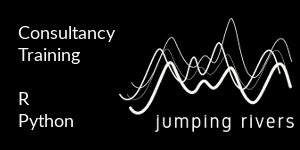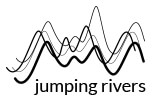Upcoming R courses with Jumping Rivers
Published: August 4, 2019

You’ll be pleased to know that Jumping rivers are running R training courses up and down the UK, in London, Newcastle, Belfast and Edinburgh. I’ve put together a quick summary of the courses available through til the end of the year. They are sorted by place then date. You can find the booking links and more detail over at our courses page. Don’t be afraid to get in contact if you have any questions!
London
12/12 - Advanced Programming in R
This is a two-day intensive course on advanced R programming. The training course will not only cover advanced R programming techniques, such as S3/S4 objects, reference classes and function closures, we will spend a significant time discussing why and where these methods are used. The course will be a mixture of lectures and computer practicals. By the end of the course, participants will be able to use OOP within there own code.
Newcastle
2/12 - 4/12 - Rapid reporting for analysts: An Introduction to R programming through to reporting in three days
This course aims to take each individual through the fundamental approach to using R programming in her current role. Ensuring that the attendees build confidence on where and how to start when they get back to their desks. By the end of the course the individual should have already introduced some automation and will be working towards automating all of their reports. Our experience shows analysts who set up a reproducible report save between 20-80% time on their task
Belfast
2/9 - Mastering the Tidyverse (Data Carpentry)
The {tidyverse} is essential for any statistician or data scientist who deals with data on a day-to-day basis. By focusing on small key tasks, the {tidyverse} suite of packages removes the pain of data manipulation. The {tidyverse} allows you to
- Import data from databases and data sources with ease
- Remove the pain of data cleaning
- Start understanding that data by transforming it, visualising it with imagery and modelling it
- Communicate your findings throughout your organisation securely and simply with apps, documents or plots
- Make business decisions based on accurate data
This training course covers key aspects of the {tidyverse}, including {dplyr}, {lubridate}, {tidyr}, {stringr} and tibbles.
3/9 - Intro to R
This is a one-day intensive course on R and assumes no prior knowledge. By the end of the course, participants will be able to import, summarise and plot their data. At each step, we avoid using “magic code”, and stress the importance of understanding what R is doing.
Edinburgh
4/10 - Intro to R
See above description
11/10 - Programming with R
The benefit of using a programming language such as R is that we can automate repetitive tasks. This course covers the fundamental techniques such as functions, for loops and conditional expressions. By the end of this course, you will understand what these techniques are and when to use them. This is a one-day intensive course on R.
18/10 - Introduction to R
See above description
25/10 - Mastering the Tidyverse (Data Carpentry)
See above description
1/11 - Advanced Graphics with R
This is a one-day intensive course on advanced graphics with R. The standard plotting commands in R are known as the base graphics, but are starting to show their age. In this course, we cover more advanced graphics packages - in particular, {ggplot2}. The {ggplot2} package can create advanced and informative graphics. This training course stresses understanding - not just one off R scripts. By the end of the session, participants will be familiar with themes, scales and facets, as well as the wider {ggplot2} world of packages.
8/11 - Statistical Modelling with R
From the very beginning, R was designed for statistical modelling. Out of the box, R makes standard statistical techniques easy. This course covers the fundamental modelling techniques. We begin the day by revising hypotheses tests, before moving on to ANVOA tables and regression analysis. The class ends by looking at more sophisticated methods such as clustering and principal components analysis (PCA).

